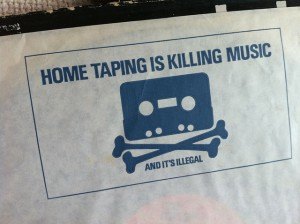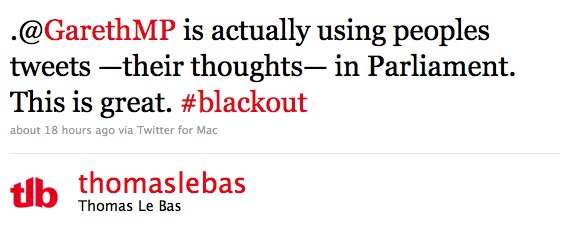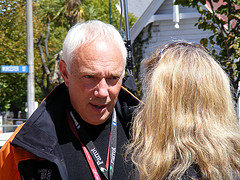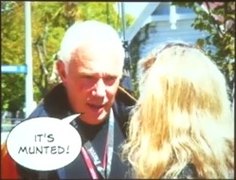 Yesterday the Copyright (Infringing File Sharing) Bill was unexpectedly rushed through Parliament during an urgent session brought about because of the Christchurch earthquake. This morning it was passed and will come into force on September 1st.
Yesterday the Copyright (Infringing File Sharing) Bill was unexpectedly rushed through Parliament during an urgent session brought about because of the Christchurch earthquake. This morning it was passed and will come into force on September 1st.
Watching the session was frustrating as few contributors truly understood file sharing and the Internet. Gareth Hughes is one of the few who actually gets it. See him talking here, here and here. He brought up a number of good points including:
- Access to the Internet is vital.
- Termination not being enacted straight away is just a delay.
- Many downloads are because content is not even available legally in New Zealand.
 (via)
(via)
The Green Party opposed the Bill because the disconnection provision was still included. Labour didn’t like the disconnection provision either, however still supported the Bill. As Labour MP Clare Curran explains on the Red Alert blog:
Account suspension remains in the bill and could theoretically be used in the future, but any Minister who implements termination will have to wear the consequences. It won’t be a Labour Minister.
This happened many times throughout the night: great points against this Bill were brought up (like disconnection; the fact it’s being rushed; that the MPs themselves don’t know what their children are downloading from the Internet, keep in mind that the MP as the probable account holder will be responsible for their children’s downloading), but then the person finished with their overall support of the Bill. Someone (I think on Twitter, sorry I lost the source) summed it up nicely: “they’re fundamentally opposed to something, yet they vote for it”.
Without this legislation copyright holders could still send warning notices, but this legislation is intended to make the process faster and cheaper. Another side effect is that the process will favor copyright holders. After receiving a warning notice from a copyright holder, it is up to the Internet account customer to prove their innocence (reversing the usual burden of proof). This basically assumes that users who have been sent notices are infringers. It is unclear (to me at least) how someone will prove that they haven’t downloaded or uploaded a file. This is concerning because copyright owners seem to get it wrong regularly. For example a University Of Washington study found they could get a copyright warning sent to a printer that wasn’t uploading or downloading copyrighted files. They say:
Q: I’m a network operator working at an ISP. Should I be suspicious of DMCA takedown notices?
Yes. Our results show that some methods used to generate DMCA takedown notices in BitTorrent are not conclusive and may misidentify users. This may also be true for other P2P networks.
A U.S. study found 57% of DMCA notices sent to Google for removal of material were sent by business targeting competitors and 37% of notices were not valid copyright claims. (Source: J Urban & L Quilter, ‘Efficient Process or “Chilling Effects”? Takedown Notices Under Section 512 of the Digital Millennium Copyright Act’, http://static.chillingeffects.org/Urban-Quilter-512-summary.pdf (mirror))
In addition to the maximum $15k fine that the Copyright Tribunal can impose on someone who has received three warnings, there is a provision in the legislation to allow the Commerce Minister to introduce a six month Internet account suspension penalty applied by a District Court. In the United Nations Conference on Trade and Development Information Economy Report, UNCTAD/SDTE/ECB/2006/1, Nov 2006, broadband is recognized as an essential utility for individuals. Disconnection from the internet is a disproportional punishment compared with the effects of illegal file sharing.
The legislation makes the Internet account holder responsible for all Internet use through that connection, treating all content downloaded/uploaded by different people through a connection as one. This may mean that a family member, flatmate or landlord is responsible for other people’s illegal file sharing. This also means that account holders could get the blame for things that people they don’t even live in the house do. The account holders would be responsible for random people accessing poorly protected wireless networks, for example.
Is pirating content really that bad?
The U.S. Government Accountability Office says in a report (via):
U.S. government and industry claims that piracy damages the economy to the tune of billions of dollars “cannot be substantiated due to the absence of underlying studies.”
and
“Some experts we interviewed and literature we reviewed identified potential positive economic effects of counterfeiting and piracy. Some consumers may knowingly purchase a counterfeit or pirated product because it is less expensive than the genuine good or because the genuine good is unavailable, and they may experience positive effects from such purchases. Consumers may use pirated goods to ‘sample’ music, movies, software, or electronic games before purchasing legitimate copies. (This) may lead to increased sales of legitimate goods.”
From a TorrentFreak article:
Although IFPI refused to share the entire research report with TorrentFreak, we can conclude the following from the two pages that were published online (pdf).
Compared to music buyers, music sharers (pirates) are…
* 31% more likely to buy single tracks online.
* 33% more likely to buy music albums online.
* 100% more likely to pay for music subscription services.
* 60% more likely to pay for music on mobile phone.
and
[Mark Mulligan, Vice President and Research Director at Forrester Research who conducted the study for IFPI (who “represents the recording industry worldwide”] has his hands tied and couldn’t say much about the findings without IFPI’s approval, but we managed to get confirmation that paying file-sharers are the music industry’s best customers. “A significant share of music buyers are file sharers also. These music buyers tend to be higher spending music buyers,” Mulligan told TorrentFreak.
TorrentFreak on artists actually profiting from piracy:
A study by Blackburn (2004), a PhD student from Harvard, found that the 75% of the [artists] actually profit from piracy. Blackburn reports that the most popular [artists] (top 25%) sell less records. However, the remaining 75% of all artists actually profit from [file sharing]. The same pattern was found by Pedersen (2006, see graph), who analyzed the change in royalties paid by the Nordisk Copyright Bureau between 2001 and 2005.
Michael Geist on a study of music purchasing habits commissioned by Industry Canada:
When assessing the P2P downloading population, there was “a strong positive relationship between P2P file sharing and CD purchasing. That is, among Canadians actually engaged in it, P2P file sharing increases CD purchases.” The study estimates that 12 additional P2P downloads per month increases music purchasing by 0.44 CDs per year.
When viewed in the [aggregate] (ie. the entire Canadian population), there is no direct relationship between P2P file sharing and CD purchases in Canada. According to the study authors, “the analysis of the entire Canadian population does not uncover either a positive or negative relationship between the number of files downloaded from P2P networks and CDs purchased. That is, we find no direct evidence to suggest that the net effect of P2P file sharing on CD purchasing is either positive or negative for Canada as a whole.”
Additionally, downloading doesn’t equal lost sales, some people are trying before they buy. And some people are downloading because they can’t get the content legally.
Labour MP Jacinda Ardern talked about illegal downloading of music hurting small artists, but it’s only the big record companies that you ever hear complaining. Big companies have bigger voices, but small artists are the ones embracing downloads by putting songs up for free on their websites.
A statistic was brought up last night that 90% of people say they will stop downloading illegally after two warnings. There’s a difference between saying and doing and I doubt there’ll be a change.
Will this make those pirates start buying again, or will they just go find the same stuff elsewhere? (via)
Update 17/04/2011: On the InternetNZ blog they point to Amanda Palmer at Webstock 2011 talking about music and giving it away for free. The relevant part starts at 25:00 but her whole talk is worth watching.
Update 19/04/2011: Jonathan Hunt tweeted a link to an episode of This Way Up on Radio NZ. Paul Brislen (from the Telecommunications Users Association Of New Zealand) and Peter Griffin (the Herald’s technology blogger) do a role play of what the notice process could be like, it starts around a third of the way in. You can listen here (MP3).
Some good points brought up:
- Generally no legal representation is allowed at the Copyright Tribunal. There will be mums and dads who have no idea what is going on, trying to prove their innocence. There will be ignoring of notices out of confusion.
- This could end up costing IPAPs (defined in the Bill as traditional ISPs; not universities, libraries, and businesses) who estimate costs as $14 to $56 per notice. It is noted in the Bill “that the United Kingdom has recently decided on a cost-sharing approach between rights holders and Internet service providers, at a ratio of 75:25 respectively”. ISPs overseas receive a huge number of these notices each day.
- If you have a business with 5000 employees, how do you track down whose actions resulted in a copyright warning being sent?
- If an Internet account is suspended, is the suspension meant to apply to all ISPs? If yes, is there going to be a database of offenders (potential privacy concerns). If no, couldn’t someone call another ISP and sign up with them?
- This is only targeting P2P file sharing. If someone illegally downloads directly from a website, they’re unlikely to be tracked down unless website logs are kept and are requested by rights holders through the courts.
- The regime won’t apply to mobile networks until August 2013. It is even easier to “sign up” for a new account; go down to the supermarket and buy another SIM card.
Update 4/06/2011: The United Nations has released a significant report (PDF) relating to freedom of expression on the Internet. A couple of paragraphs are extremely relevant to this post:
49. …he is alarmed by proposals to disconnect users from Internet access if they violate intellectual property rights. This also includes legislation based on the concept of “graduated response”, which imposes a series of penalties on copyright infringers that could lead to suspension of Internet service, such as the so-called “three-strikes-law” in France34 and the Digital Economy Act 2010 of the United Kingdom.35
78. …cutting off users from Internet access, regardless of the justification provided, including on the grounds of violating intellectual property rights law, to be disproportionate and thus a violation of article 19, paragraph 3, of the International Covenant on Civil and Political Rights.
79. …the Special Rapporteur urges States to repeal or amend existing intellectual copyright laws which permit users to be disconnected from Internet access, and to refrain from adopting such laws.
Image credit: Gary Denham


 HRC pressures King & Spalding to drop case defending the
HRC pressures King & Spalding to drop case defending the  Yesterday the
Yesterday the  (
(